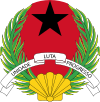Cape Verde–Guinea-Bissau relations
 | |
Cape Verde |
Guinea-Bissau |
|---|---|
Cape Verde–Guinea Bissau relations refers to the
Colonial history
The area on the mainland under Portuguese rule now containing Guinea-Bissau was originally called "Guiné de Cabo Verde". Cape Verde was a site of transit in the slave trade from Guinea-Bissau to the Americas.[1] Portuguese Cape Verde supplied many colonial officials for the mainland Portuguese Guinea, later Guinea-Bissau, at one point making up three-quarters of the civil service.[1]
Independence
Cape Verde and Guinea-Bissau campaigned together for independence from Portugal, chiefly led by Amílcar Cabral's Marxist African Party for the Independence of Guinea and Cape Verde (PAIGC) from 1956.[1] Cape Verde provided the bourgeoisie that led the anti-colonial movement in Portuguese Guinea.[2] An ideology of unity was key to Cabral's theory of African liberation, and Cabral was himself Cape Verdean Guinea-Bissauan, though the call for unity was partly a tactic to avoid Guinea-Bissau becoming independent without Cape Verde, as the latter had closer ties to Portugal.[3] The PAIGC then fought the Guinea-Bissau War of Independence (part of the wider Portuguese Colonial War), and declared independence in 1973, being formally granted independence in September 1974. Cape Verde joined Guinea-Bissau in independence from Portugal when it peacefully negotiated independence on 5 July 1975,[2] following the April 1974 Carnation Revolution in Portugal, and Aristides Pereira of the PAIGC became president. The intent was unification, as written into the two countries' constitutions.[2] The PAIGC viewed them as "sister republics" with "two bodies with only one heart", and the countries shared a flag and national anthem.[1]
However, the elites in Cape Verde opposed unification, there were constitutional and legal differences, and the trade between them was minor.[1] On November 14, 1980, a coup d'état by João Bernardo Vieira against "foreign" mestiços overthrew the government of Luís Cabral (half-brother of Amílcar) in Guinea-Bissau, leading to Cape Verde separating under Pedro Pires on January 20, 1981 and forming the ruling African Party for the Independence of Cape Verde (PAICV).[1][2]
1980s–2000s
From 1980 to 2000, during the Vieira presidency in Guinea-Bissau, the countries were less closely involved. Guinea-Bissau experienced a lack of development and periods of violence while Cape Verde was relatively stable. Guinea-Bissau was, like other "non-aligned" African states, closer to the Soviet Union, while Cape Verde, nominally Marxist, formed relations with Western countries due to a dependence on food imports following drought.[2] Diplomatic relations were restored after the presidents met in June 1982, and an ambassador from Cape Verde was received by Guinea-Bissau in July 1983.[1]
After multi-party politics was introduced in Cape Verde in 1990, the victorious Movimento para Democracia changed the flag and national anthem away from being similar to that of Guinea-Bissau.[1]
In the 1998
Bilateral relations post 2010
Relations have improved since the election of
Cultural relations
Cape Verde and Guinea-Bissau share the Portuguese language as their official language, and the Portuguese creole Crioulo language as a recognised language.[1]
Cape Verdean Guinea-Bissauans have formed an Associação dos Filhos e Descendentes de Cabo Verde, and Guinea-Bissauan Cape Verdeans, who number around 8–9000, have formed an Associacao dos Guineeneses Residentes em Cabo Verde. Despite their shared language and culture, immigrants from Guinea-Bissau are often viewed as "manjacos", a derogatory term used for people from mainland Africa[1] and the legalisation of Guinea-Bissauans in Cape Verde has been long delayed.[7][8]
Resident diplomatic missions
See also
- Conference of Nationalist Organizations of the Portuguese Colonies
- Foreign relations of Guinea-Bissau
- Foreign relations of Cape Verde
- Cape Verdean Guinea-Bissauan
References
- ^ a b c d e f g h i j k l m Mendy, Peter Karibe; Lobban, Jr., Richard A. (October 17, 2013). "Cape Verde, Relations with". Historical Dictionary of the Republic of Guinea-Bissau. Scarecrow Press. Retrieved October 29, 2015.
- ^ a b c d e f MacQueen, Norrie (February 1, 2006). "Widening trajectories: Guinea Bissau and Cape Verde since independence". Relações Internacionais. Archived from the original on April 23, 2015. Retrieved October 29, 2015.
- ISBN 9789004226012. Retrieved October 30, 2015.
- ^ "Cabo Verde air carrier resumes flights to Guinea-Bissau". Macau Hub. June 5, 2015. Retrieved October 30, 2015.
- ^ "Cabo Verde PM visits Guinea-Bissau to enhance relations". Macau Hub. July 17, 2015. Retrieved October 30, 2015.
- ^ "Cabo Verde approves agreement to avoid double taxation with Guinea-Bissau". Macau Hub. September 21, 2015. Retrieved October 30, 2015.
- ^ "Guinea Bissau to plans to open embassy in Cape Verde". Macau Hub. October 6, 2011. Retrieved October 28, 2015.
- ^ "Guinea Bissau opens consulate in Praia". A Semana. October 1, 2011. Archived from the original on June 23, 2016. Retrieved October 31, 2015.
External links
- News on Cape Verde–Guinea-Bissau relations on Macau Hub


